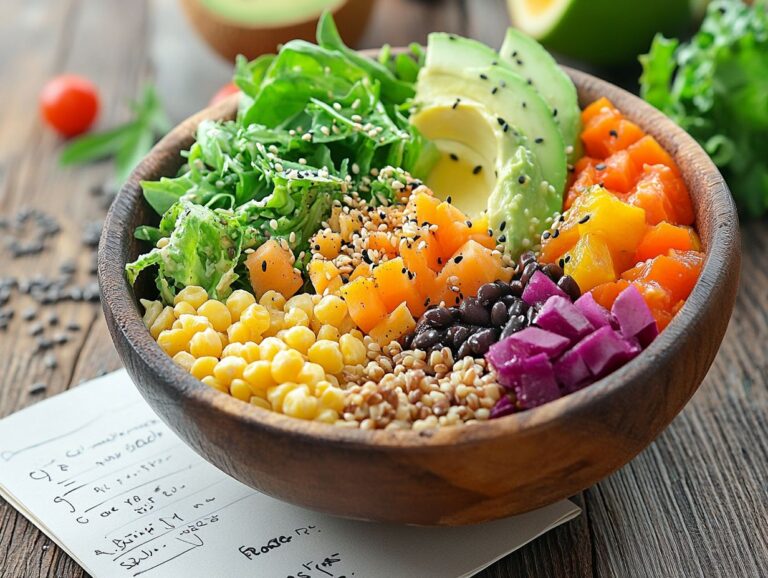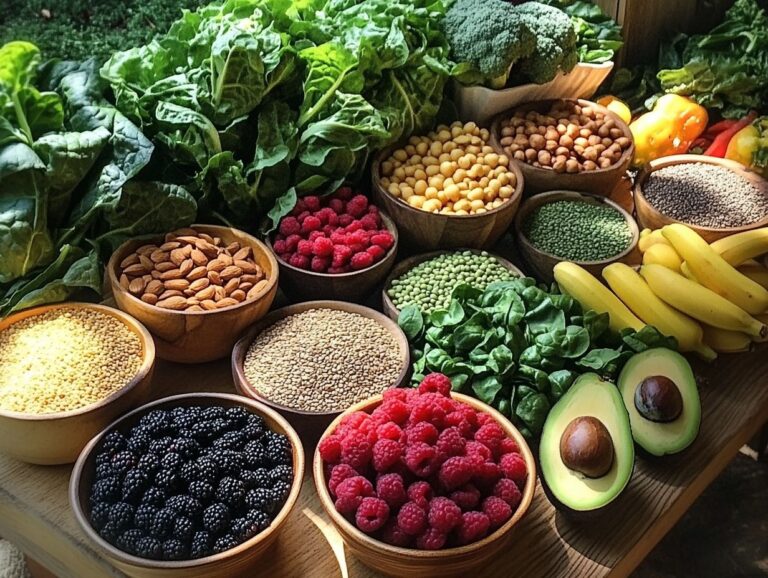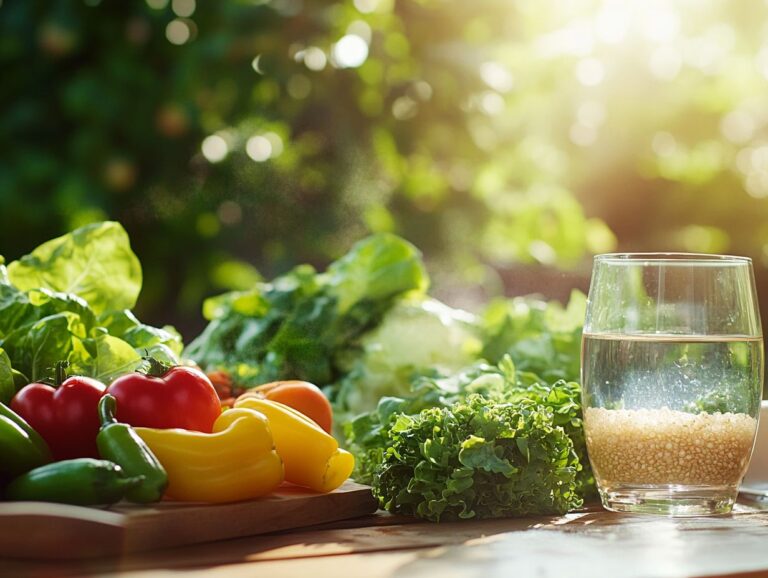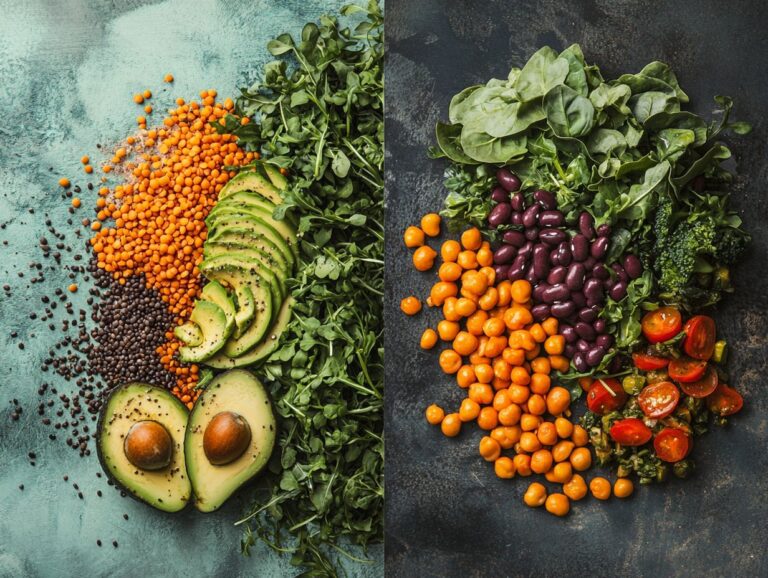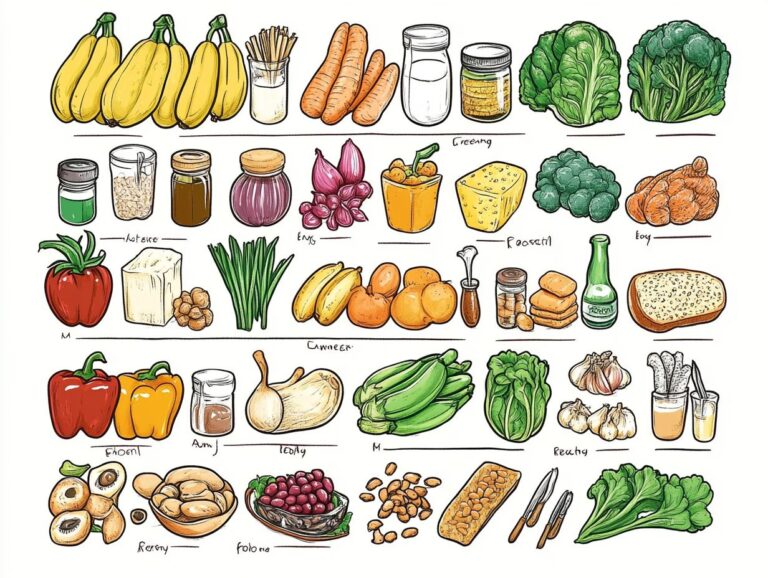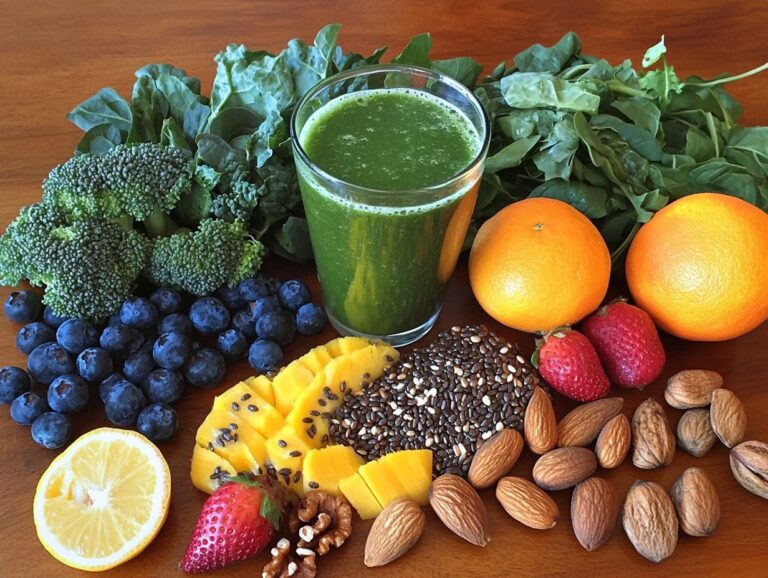The Vegan Clear Liquid Diet consists solely of clear, plant-based liquids. This short-term diet is designed to provide a nutritional reset and prepare individuals for medical procedures, such as a colonoscopy. In this discussion, we will explore the reasons for following this diet, its benefits, and the foods that can and cannot be consumed, such as fruit juices and broth. Additionally, we will cover how to prepare for the diet and how to transition off it. We will also discuss potential risks and nutrient deficiencies to ensure a comprehensive understanding before making any dietary modifications, with a focus on digestive health and colorectal cancer prevention.
Key Takeaways:
- A vegan clear liquid diet involves consuming only clear liquids such as broth, juice, and tea, and avoiding any solid foods.
- People may choose to follow a vegan clear liquid diet for various reasons, including pre- and post-surgery, digestive issues, and detoxing.
- While a vegan clear liquid diet can provide benefits such as digestive rest and hydration, it can also lead to potential nutrient deficiencies and should not be followed for an extended period without medical supervision.
What is a Vegan Clear Liquid Diet?
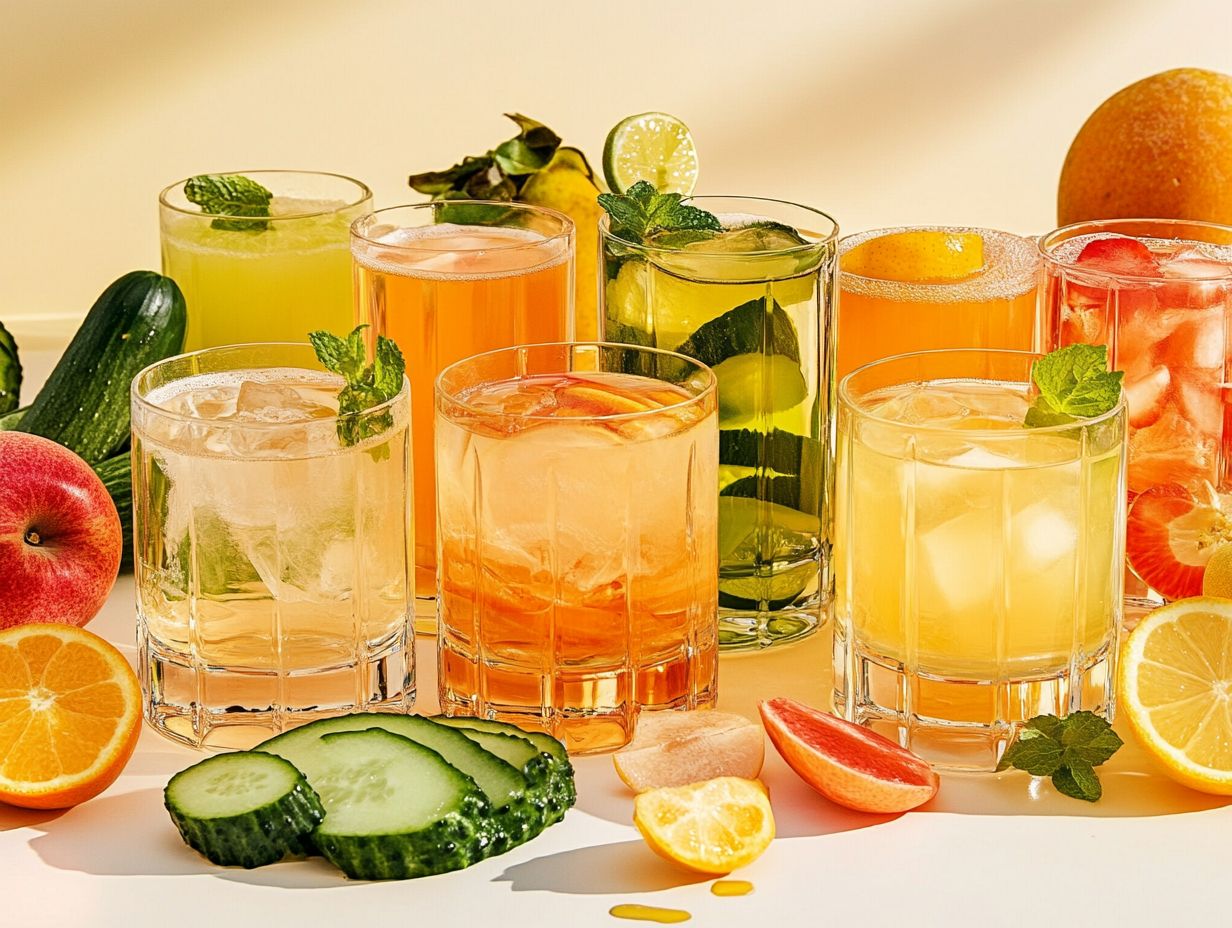
A Vegan Clear Liquid Diet is a temporary eating plan that consists solely of clear liquids, excluding solid food. It is often utilized for medical purposes, such as bowel preparation before a colonoscopy.
This type of diet aims to ensure proper hydration and provide essential nutrients while minimizing gastrointestinal distress, making it particularly relevant for colorectal cancer patients and others preparing for procedures or surgeries related to bowel cancer or other gastrointestinal disorders.
The diet typically includes vegan options such as fruit juices, broth, and various clear liquids, ensuring it aligns with the dietary restrictions of those following a plant-based lifestyle while still promoting digestive health and nutrient absorption.
Why Would Someone Follow a Vegan Clear Liquid Diet?
A Vegan Clear Liquid Diet is followed for several important reasons, including bowel preparation for colonoscopy, short-term use during gastrointestinal distress, and adherence to dietary guidelines related to cancer treatment and prevention, as emphasized by organizations like the American Cancer Society.
This diet can be beneficial in bowel preparation for medical examinations, as it allows for a clear view of the colon while accommodating the dietary restrictions and ethical considerations of patients who prefer plant-based foods.
Additionally, it may be recommended for individuals recovering from surgery or experiencing nausea, as it provides hydration and essential nutrients with minimal solid food intake, an approach supported by experts like Dr. Will Bulsiewicz, author of “Fiber Fueled.”
A Vegan Clear Liquid Diet can help alleviate symptoms associated with certain conditions, facilitating a smoother transition back to regular eating patterns.
It is crucial to consult with a healthcare provider to ensure that the clear liquid vegan diet meets an individual’s specific health needs and to address any potential nutrient deficiencies that may arise. Personal guidance and supervision from a doctor can help maximize the benefits of this transitional diet.
What are the Benefits of a Vegan Clear Liquid Diet?
The advantages of a Vegan Clear Liquid Diet primarily relate to digestive health and gastrointestinal procedures, such as colonoscopy. This diet ensures that the bowels are adequately flushed, which is essential for effective bowel preparation before medical examinations, facilitating improved detection of potential issues like colorectal cancer. The use of products such as Ensure Clear, Gatorade, or Powerade can assist in maintaining energy levels. Additionally, this diet aids in nutrient absorption while limiting the intake of cancer-promoting compounds, making it an important dietary approach for cancer prevention.
By restricting solid food intake, this clear liquid dietary pattern promotes overall digestive health and reduces stress on the gastrointestinal tract. This not only benefits individuals undergoing medical procedures but also provides a gentle cleanse for anyone looking to reset their digestive system, appreciating the fiber benefits of a fiber-rich diet after the liquid phase.
Following a vegan clear liquid diet can help alleviate symptoms of digestive discomfort, such as bloating or gas, making it particularly helpful for individuals with sensitive stomachs or conditions like Crohn’s disease and diverticulitis. Moreover, by utilizing plant-based clear liquids, the diet promotes hydration and delivers vital nutrients, further enhancing the body’s healing processes and supporting overall well-being.
What Can You Eat on a Vegan Clear Liquid Diet?
A Vegan Clear Liquid Diet consists of clear liquids and plant-based foods, including clear broth, fruit juices, and other vegan options that do not contain dairy products or solid food particles. This diet helps maintain hydration and provides essential nutrients while adhering to plant-based restrictions, making it an effective option for individuals preparing for medical procedures, such as a colonoscopy.
Suggested options for this diet include:
- Vegetable broth, a key element in ensuring a high-quality bowel prep for medical procedures.
- Herbal teas
- Clear, pulpless fruit juices like apple or grape juice
Additionally, clear smoothies made from blended fruit, without any dairy or protein additives, can be consumed. It is important to avoid non-vegan clear broth options, as well as artificial and processed flavorings, which highlights the necessity of careful label reading due to food restrictions.
By following these guidelines, individuals on the diet can successfully nourish themselves while upholding their moral convictions against the use of animal products.
What are Some Examples of Vegan Clear Liquid Foods?
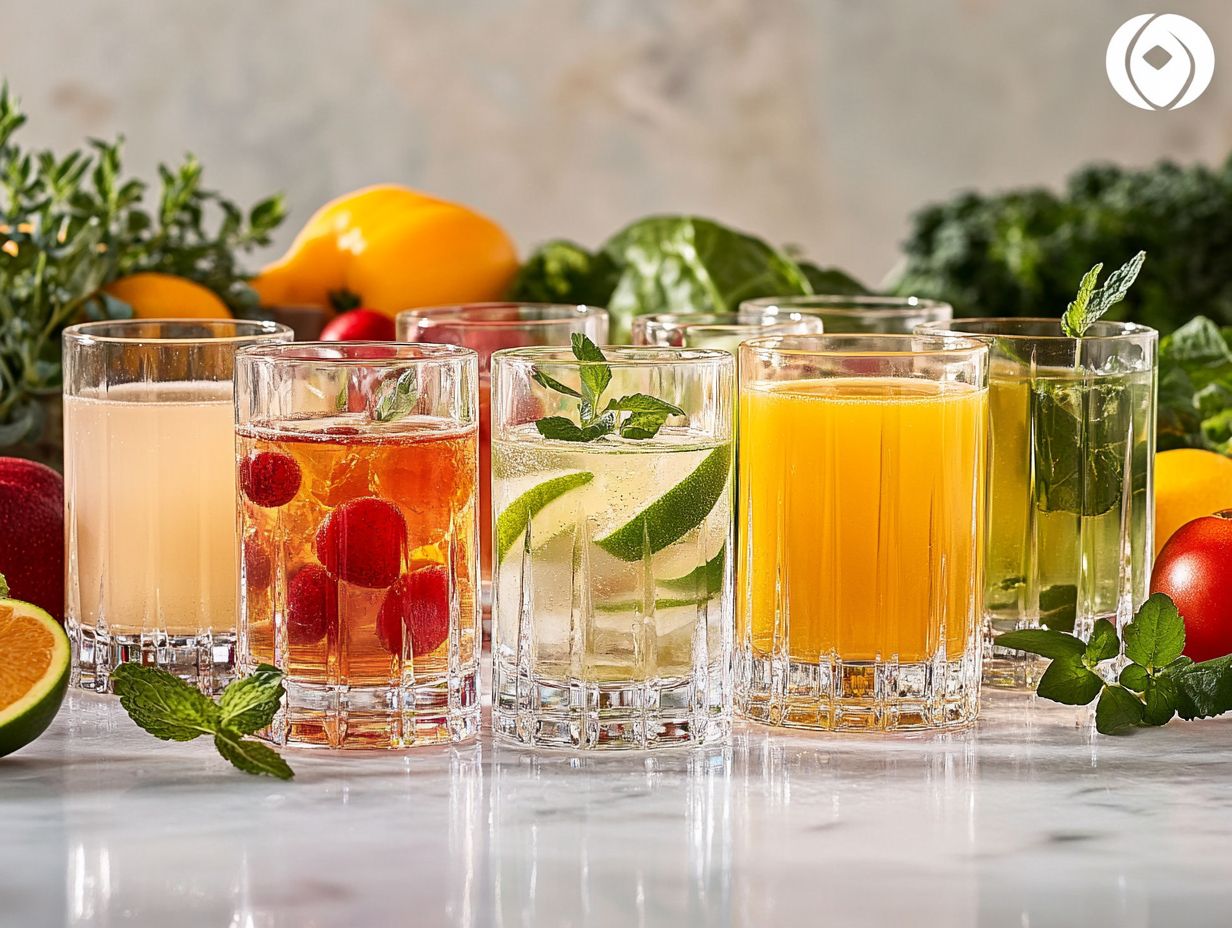
Examples of vegan clear liquid foods include clear broths, fruit juices without pulp, and certain gelatin products that do not contain animal byproducts. These foods are essential for adhering to a Vegan Clear Liquid Diet, helping to ensure proper hydration and energy intake, especially for those undergoing procedures like colonoscopies, which require thorough colon cleaning.
Along with these core items, various brands offer high-quality clear liquids that meet this dietary requirement.
- For vegan clear broth, vegetable broths from brands such as Imagine Foods or Pacific Foods, available in flavors like mushroom or roasted garlic, are excellent options.
- In terms of vegan clear juices, fruit juices without pulp from brands like Tropicana or Simply Orange offer a variety of flavors.
- For vegan gelatin, products like Agar-Agar from Woodside Pantry or fruit-flavored gelatins made with carrageenan from Jel Dessert are suitable choices.
- Additionally, young coconut water from brands like Harmless Harvest or Zico provides a refreshing option, while caffeine-free clear herbal teas such as chamomile or peppermint from brands like Traditional Medicinals or Celestial Seasonings can also be included, avoiding caffeinated beverages.
What Foods Should You Avoid on a Vegan Clear Liquid Diet?
A Vegan Clear Liquid Diet consists of liquids that do not contain any solid, fiber, or milk-based components, along with foods devoid of these elements, aligning with a low-fiber diet. The primary purpose of adhering to a clear liquid diet is to allow the digestive system to rest and prepare the bowel for medical procedures.
During this time, it is crucial to avoid any food or drink products that may contain cancer-causing compounds, aligning with the diet’s goal of promoting overall health and preventing the onset of cancer and obesity.
Specifically, individuals following a Vegan Clear Liquid Diet should refrain from consuming the following categories of liquids:
- Sugary Beverages: This includes sodas and fruit juice beverages with pulp, as these can place unnecessary strain on the digestive system.
- Caffeinated Beverages: Coffee and strong teas should be avoided, as they can irritate the gastrointestinal tract.
- Alcoholic Beverages: All forms of alcohol should not be consumed, as they lead to dehydration and interfere with the body’s recovery processes.
- Artificial and Processed Flavorings: These are present in many beverage types and can introduce unwanted additives that compromise digestive health.
How Long Should You Follow a Vegan Clear Liquid Diet?
A Vegan Clear Liquid Diet is typically followed for a duration of 1 to 3 days, depending on specific medical conditions and the guidance of a healthcare provider. This diet, often prescribed as a pre-colonoscopy meal, is crucial for thorough bowel preparation.
The length of time for which one should adhere to this diet should be discussed with a doctor to ensure that personal medical conditions are taken into account and that digestive health is not compromised.
Various factors influence the duration of a vegan clear liquid diet, including underlying medical conditions, the purpose of the diet, and individual tolerance levels. For instance, individuals with digestive disorders may need to follow the diet for a longer period to aid in healing, while others might only require it briefly for a medical procedure.
Personal factors, such as age, nutritional needs, and overall health status, are also essential in determining how long one should follow the vegan clear liquid diet. Therefore, it is crucial to consult with a healthcare professional to ensure that the diet aligns with the individual’s health goals and minimizes potential risks.
What are the Potential Risks of a Vegan Clear Liquid Diet?
While a Vegan Clear Liquid Diet can be effective, it carries potential risks, including nutrient deficiencies and gastrointestinal distress if followed for an extended period without proper oversight.
These dangers must be acknowledged, as the diet excludes fiber-rich foods that are essential for balanced nutrition, which could lead to negative long-term health effects if not properly monitored.
Individuals on this diet may not receive vital vitamins and minerals, such as B12, iron, and calcium, which are often lacking in both clear liquid and vegan diets, highlighting the importance of a doctor consultation for those with stage 3 cancer or similar conditions.
The prolonged exclusion of solid foods can result in physical health issues such as nutrient absorption problems and psychological challenges, including feelings of deprivation and compulsive eating behaviors.
Therefore, any decision to maintain such a restrictive dietary regimen should involve careful planning, doctor consultation, and regular oversight by medical professionals.
Monitoring nutrient intake is crucial, as it informs necessary adjustments to ensure overall health is prioritized, to prevent gastrointestinal distress, and to avoid negative side effects.
What Nutrients Might You Be Missing on a Vegan Clear Liquid Diet?
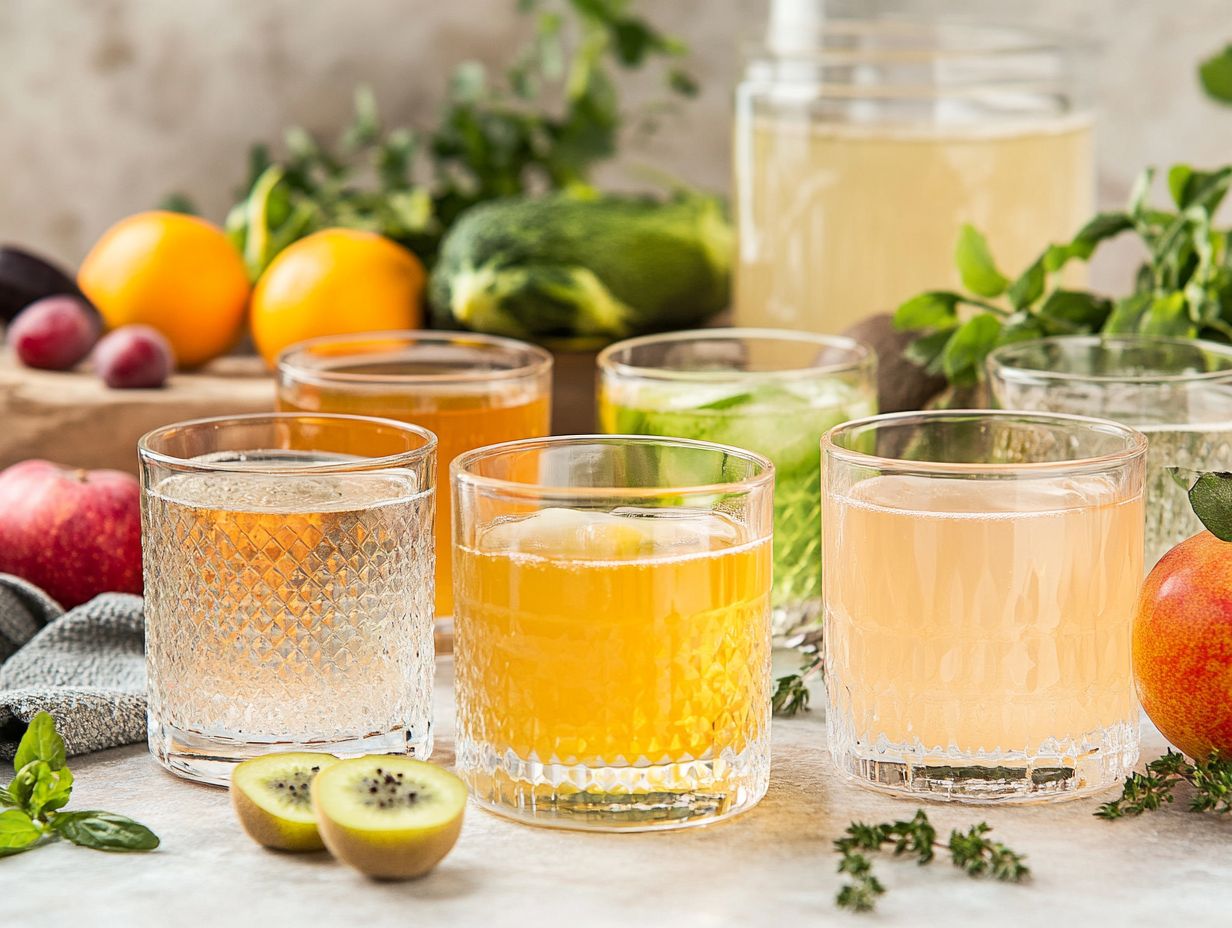
Individuals following a Vegan Clear Liquid Diet may miss out on essential nutrients. Deficiencies are most noticeable in fiber, vitamins, and minerals that are typically found in a more balanced diet that includes whole grains, legumes, and vegetables, which are often recommended by dietary guidelines for optimal health.
The exclusion of these food groups can result in deficiencies that negatively impact overall health, particularly digestive functions. Therefore, it is crucial to consider dietary guidelines, potential supplementation, and vegan options to maintain health.
Essential nutrients such as vitamin B12, iron, and zinc, which are abundant in animal products, may be lacking in this type of diet, potentially leading to fatigue, impaired immune responses, and decreased nutrient absorption over time.
Additionally, the limited variety inherent in a clear liquid diet may result in inadequate intake of antioxidants, which are important for reducing oxidative stress, supporting overall cellular health, and aiding in cancer prevention.
Can a Vegan Clear Liquid Diet Cause Weight Loss?
A Vegan Clear Liquid Diet can lead to weight loss in individuals because it is lower in calories compared to a regular balanced diet. Since this diet primarily consists of clear liquids, overall calorie consumption is reduced, which may result in weight loss. However, it is important to approach this diet with an awareness of its potential adverse effects on long-term health and nutritional balance.
The clear liquid diet significantly decreases daily caloric intake, as clear liquids such as vegetable broth, herbal teas, and fruit juices serve as the primary sources of nutrition. This restriction often creates a calorie deficit, leading to the utilization of fat as an energy source over time and potentially aiding in obesity management.
Furthermore, this diet is low in protein, fiber, and essential vitamins, resulting in only short-term weight loss. Because of the deficiency in these critical nutrients, individuals should consult a medical provider or nutritionist to ensure they are receiving proper nutrition and to explore acceptable alternative strategies for healthy weight loss, avoiding long-term health risks associated with nutrient deficiencies.
Can a Vegan Clear Liquid Diet Cause Nutrient Deficiencies?
Yes, a Vegan Clear Liquid Diet can lead to nutrient deficiencies, particularly if followed for an extended period without nutritional supplementation. The lack of solid, fibrous foods and other essential nutrients can negatively impact digestive health and result in long-term health issues, such as Crohn’s disease and diverticulitis, underscoring the importance of adhering to the diet’s limitations.
Individuals who adopt this highly restrictive diet may miss out on vital vitamins and minerals, especially protein, iron, and calcium, which are essential for overall health. The risks associated with these deficiencies may include compromised immune function, fatigue, decreased bone density, and potential cancer-causing compounds forming due to nutrient imbalances.
To mitigate the health effects of the diet, it is advisable to begin reintroducing a variety of healthy, nutrient-rich plant-based foods as soon as possible. Additionally, consulting with a medical professional or registered dietitian can be beneficial in developing a comprehensive plan, considering the fiber benefits and high-quality bowel prep, to ensure the inclusion of all vital nutrients, making it easier for individuals to adopt a balanced and healthy lifestyle.
How to Prepare for a Vegan Clear Liquid Diet?
Preparing for a Vegan Clear Liquid Diet requires careful planning and consultation with a healthcare provider, especially if the diet is being followed for medical reasons, such as before a colonoscopy or as part of a bowel preparation for other procedures.
It is essential to understand the dietary restrictions and to gather appropriate vegan options that comply with the guidelines for clear liquids. To start, individuals should create a detailed meal plan outlining the clear liquids to be consumed each day, prioritizing options such as vegetable broth, clear fruit juices without pulp, and other clear liquids like Gatorade, Powerade, and Ensure Clear.
Developing a comprehensive shopping list is crucial; this list should include all necessary items to avoid last-minute scrambles or missing key ingredients. It is highly advisable to work with a healthcare professional who can provide personalized guidance and ensure that nutritional needs are met, helping to prevent any deficiencies and ensuring a high-quality bowel prep.
With the right support and preparation, this transitional diet can be both effective and manageable.
What Foods Should You Eat Before Starting a Vegan Clear Liquid Diet?
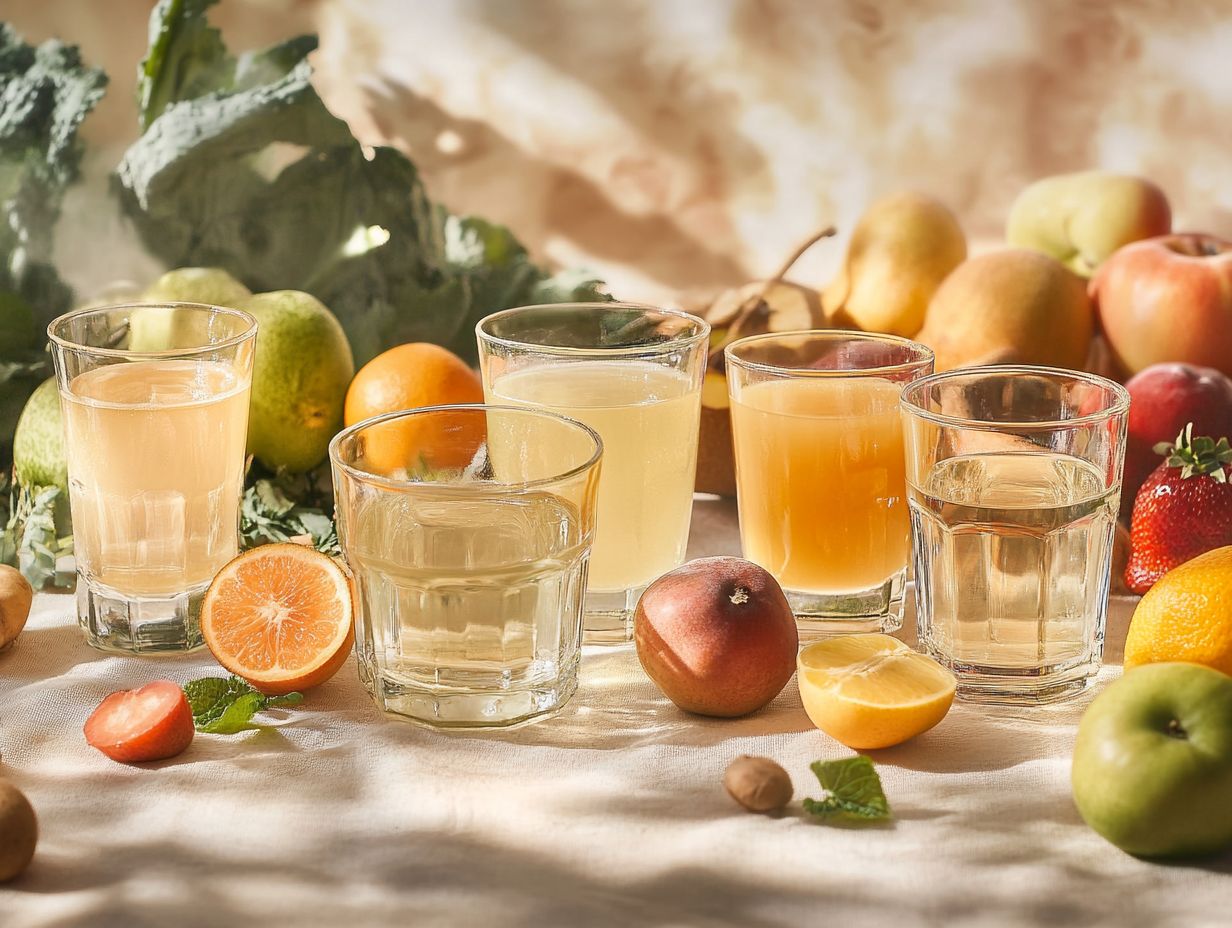
Before starting a Vegan Clear Liquid Diet, it can be beneficial to follow a low-fiber diet that includes easily digestible foods to prepare the digestive system for the transition to clear liquids. This pre-colonoscopy meal should adhere to dietary guidelines that promote digestive comfort, such as those suggested in “Fiber Fueled” by Will Bulsiewicz, and facilitate a smoother experience during the subsequent clear liquid phase.
During this phase, individuals might consider incorporating foods such as:
- White rice
- Plain pasta
- Skinless potatoes
All of which are gentle on the digestive tract. Other suitable options include:
- Ripe bananas
- Smooth applesauce
- Broths made from vegetables or legumes, ensuring that they are free from solid pieces.
Clear forms of plant-based beverages, such as herbal teas and diluted juices, can help keep the body hydrated while avoiding excess fiber. These choices not only support digestive health but also effectively prepare the body for the clarity and gentleness of the upcoming liquid diet, as recommended by the American Cancer Society for cancer prevention and overall health.
How to Mentally Prepare for a Vegan Clear Liquid Diet?
Mental preparation for a Vegan Clear Liquid Diet is essential and involves understanding the rationale behind the diet, recognizing potential challenges, and developing strategies to cope with these changes. This preparation can be facilitated through consultations with healthcare providers, and for some individuals, support groups may serve as a valuable source of encouragement and advice on navigating this temporary dietary commitment, particularly for those dealing with conditions like stage 3 cancer.
Setting realistic expectations regarding the duration and limitations of the Vegan Clear Liquid Diet can help minimize stress associated with the diet. Additionally, taking a moment to reflect positively on the experience can be beneficial, as can acknowledging the health benefits and the opportunity for a fresh start.
Sharing the journey of the Vegan Clear Liquid Diet with peers who are facing similar situations can also be incredibly helpful; shared experiences and tips can foster a sense of community. Moreover, experimenting with new recipes within the parameters of the liquid diet may help maintain motivation and enthusiasm, making the journey more enjoyable and manageable.
What to Expect During a Vegan Clear Liquid Diet?
When following a Vegan Clear Liquid Diet, individuals may experience physical sensations such as hunger and digestive changes, including fewer bowel movements, as the body adjusts to the absence of solid food.
Being aware of these effects and understanding practices to mitigate them can help set realistic expectations for a smoother experience during this dietary phase, whether it is part of bowel preparation for a colonoscopy or another procedure.
As the body adapts to this restrictive eating plan, some people may feel fatigued or light-headed due to decreased calorie intake and lack of solid nutrition. The absence of familiar textures and tastes may trigger cravings, leading to psychological challenges as mental eating triggers become evident. Additionally, the restricted diet may be particularly challenging for individuals with conditions like Crohn’s disease or diverticulitis.
Many individuals face emotional difficulties related to food, and support from friends or family can be beneficial during this time. Staying hydrated with clear vegan options, such as broth and juice, can help alleviate discomfort and prevent dehydration throughout the duration of this temporary diet, supporting overall well-being and digestive health.
What Are Some Common Side Effects of a Vegan Clear Liquid Diet?
Common side effects of a Vegan Clear Liquid Diet may include hunger, fatigue, and gastrointestinal discomfort as the body adjusts to the absence of solid food. While these side effects are often temporary, it is important to monitor your health closely and consult a healthcare provider if severe discomfort arises during this phase of the diet to prevent long-term issues such as nutrient malabsorption and digestive health problems.
To help minimize these side effects, consider the following tips, which can also benefit those undergoing colon cleaning:
- Drink plenty of liquids, including broth, herbal teas, and clear fruit juices. If available, you can also incorporate small quantities of electrolyte solutions to help reduce fatigue and maintain energy levels.
- Consume liquid meals more frequently rather than opting for fewer, larger portions to help alleviate feelings of hunger.
- If you experience gastrointestinal distress, consider trying soothing options such as ginger tea or peppermint, both of which are known for their digestive benefits.
- Practicing mindfulness techniques during mealtime can enhance the experience and promote overall well-being during this dietary transition.
How to Transition Off of a Vegan Clear Liquid Diet?
The first step following a Vegan Clear Liquid Diet is a gradual transition back to normal eating. This phase should begin with smoothly textured, easily digestible foods that are high in fiber to help the digestive system reacclimate to solid foods. Careful reintroduction of foods, such as those recommended by Will Bulsiewicz in “Fiber Fueled,” is essential to promote digestive health and avoid gastrointestinal distress after the Vegan Clear Liquid Diet phase.
Soft fruits, such as bananas and applesauce, provide natural sweetness without added sugars and are gentle on the stomach. Cooked vegetables like carrots and zucchini are nutrient-rich and easy to digest, making them suitable for a low-fiber diet often recommended during bowel preparation for procedures like a colonoscopy.
Whole grains, such as oatmeal and quinoa, can be included as comfort increases with these previous foods. It’s advisable to start with small portions while the body adjusts, and over time, proteins like legumes or tofu can be added to create a more balanced diet. This gradual approach after the Vegan Clear Liquid Diet, often recommended after colon cleaning for its benefits to digestive health, can help establish a varied and nutritious diet without overwhelming the digestive system.
What Foods Should You Start Incorporating Back into Your Diet?
After a Vegan Clear Liquid Diet, often used for bowel preparation, it’s important to introduce gentle, fibrous plant foods to aid the digestive tract in adjusting to solid foods and to ensure a healthy return to normal digestive activity. This is particularly crucial for individuals recovering from gastrointestinal distress or following dietary guidelines for conditions like Crohn’s disease or diverticulitis.
Foods such as cooked vegetables, whole grains, and legumes are excellent choices. Including options like oatmeal, quinoa, and brown rice significantly boosts the fiber content of the diet, which is essential for promoting healthy bowel movements and supporting gut health.
Additionally, legumes such as lentils and chickpeas not only increase fiber intake but also provide protein and other vital nutrients. Vegetables like spinach, carrots, and sweet potatoes are ideal as they are easy to digest while supplying dietary fiber.
Fruits such as bananas, berries, and apples are also beneficial, as they add natural sugars to meals and assist with digestion. Including fruit juices, when tolerated, can be part of a clear liquid diet, which might be recommended by a doctor consultation for specific digestive health needs. By choosing a variety of these foods, individuals can foster healthy new relationships with food as they recover.
How to Avoid Overeating After a Vegan Clear Liquid Diet?
To avoid overeating after a Vegan Clear Liquid Diet, it is essential to eat mindfully by recognizing hunger cues and controlling portion sizes. Gradually reintroducing solid foods helps prevent overloading the digestive system, a crucial aspect in cancer prevention and reducing obesity risks as highlighted by the American Cancer Society.
This approach not only promotes healthy digestive functioning but also aids in restoring a positive relationship with food after a period of restriction. Savoring the texture and flavors of each bite enhances the mealtime experience, making it more pleasurable and satisfying.
The importance of chewing slowly is twofold: it facilitates the digestion of food and allows the body to signal when it is full. Minimizing distractions, such as putting away phones and turning off the television, enables individuals to focus on their meals, which typically results in lower food consumption.
By listening to internal hunger signals rather than adhering to strict meal schedules, individuals can cultivate a sense of intuitive eating that ultimately leads to healthier and more mindful choices.
